|
|
|
Sort Order |
|
|
|
Items / Page
|
|
|
|
|
|
|
| Srl | Item |
| 1 |
ID:
172453
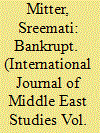

|
|
|
|
|
| Summary/Abstract |
In the late 1930s, the first independent Arab banks in Palestine, the Arab Bank and the Arab Agricultural Bank, sued customers who had defaulted on loans in an attempt to maintain solvency. Their indebted customers, unable to pay, fought back to prevent their lands from being foreclosed and sold to Zionist buyers. Each party claimed that its position was consistent with, indeed essential to, the anti-Zionist nationalist cause. The story of these pioneering Arab banks and their legal battles with their customers in the wake of the 1936-1939 revolt provides insight into Arab financial life in Mandate Palestine. It reveals the banks’ struggles to survive; complicates notions of Arab-Palestinian landlessness and indebtedness; and argues that political and economic exigencies, not reductive notions of collaboration or patriotism, produced the banks’ antagonistic relationship with their customers, whereby the survival of one came at the expense of the other.
|
|
|
|
|
|
|
|
|
|
|
|
|
|
|
|
| 2 |
ID:
172449
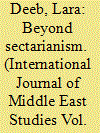

|
|
|
|
|
| Summary/Abstract |
Based on interviews with Lebanese in over 150 mixed-religion marriages and their extended family members, I argue that sect may conceal or stand in for other forms of difference, including ideas about status and hierarchy related to class and regional origin in Lebanon. Because it is the most readily available discourse for understanding social difference, parents often use sectarian rhetoric to describe their concerns about a variety of problems they see in their children's chosen partners. By listening between the lines of parental objections, I suggest that expressions of bias against people of other sects may mask concerns with other forms of social difference, in effect reducing a complex and shifting social field of multiple axes of difference into sect. Rather than assume sectarianism's a priori importance, this approach allows me to bring other discourses of difference and analytic lenses to the foreground.
|
|
|
|
|
|
|
|
|
|
|
|
|
|
|
|
| 3 |
ID:
172450
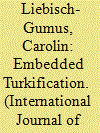

|
|
|
|
|
| Summary/Abstract |
This article traces intersections between Turkey's relations with the League of Nations and violent homogenization in Anatolia in the two decades following World War I. It advances the argument that the strife for creating a homogenous population—a core element of Turkish nation building—was embedded in the international order. This is explained on two levels. First, the article stresses the role of international asymmetries on the mental horizon of the Turkish nation builders. The League's involvement in the allied plans to partition Turkey had the organization wrapped up in a mélange of humanitarian concerns, civilizing doctrine, and imperialist interests. Turkish nationalists wanted to avoid those imperialist pitfalls and overcome international minority protection by means of Turkification. They saw international humanitarianism as an obstacle to their nationalist line. Second, the article highlights the ways in which the League itself supported the Kemalists’ drive for Turkification, either directly, especially in the case of the “population transfer” between Greece and Turkey, or indirectly through prioritizing Turkey's sovereignty over minority concerns.
|
|
|
|
|
|
|
|
|
|
|
|
|
|
|
|
| 4 |
ID:
172454
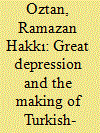

|
|
|
|
|
| Summary/Abstract |
This article explores how the Great Depression in 1929 led to the expansion of illicit circuits globally, and examines the ways in which the introduction of anti-smuggling campaigns came to consolidate the border regimes in Turkey and French Syria. The global economic downturn in the late 1920s led states to embrace protectionist measures such as heightened tariffs and import quotas, all designed to protect local industries and maintain a favorable trade balance. The introduction of such measures, however, often resulted in the emergence of highly profitable illicit circuits, including in the borderland between Turkey and Syria. Here, a sturdy coalition of producers, shop owners, smugglers, trackers, and peddlers began to smuggle into Turkey a range of goods from silk textiles to cigarette papers, while funneling out narcotics into Syria. By seeking the global trajectories of such commodity flows, this article examines the impact of these borderland mobilities on the making of Turkey's southern border by exploring the local and bureaucratic responses to a rapidly changing world economic order in the aftermath of the Great Depression.
|
|
|
|
|
|
|
|
|
|
|
|
|
|
|
|
| 5 |
ID:
172448
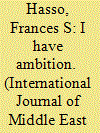

|
|
|
|
|
| Summary/Abstract |
This article provides a close reading of two popular Egyptian action films, al-Almani (The German, 2012), the first blockbuster since the 25 January 2011 revolution, and Qalb al-Asad (Lion heart, 2013), both starring Muhammad Ramadan as a socially produced proletarian “thug” figure. Made for Egyptian audiences, the films privilege entertainment over aesthetics or politics. However, they express distinct messages about violence, morality, and revolution that are shaped by their moments of postrevolutionary release. They present the police state in salutary yet ambivalent terms. They offer a rupture with prerevolutionary cinema by staging the failure of proletarian masculinities and femininities that rely on middle-class respectability in relation to sex, marriage, and work. Even as each film expresses traces of revolutionary upheaval and even nostalgia, cynicism rather than hopefulness dominates, especially in al-Almani, which conveys to the middle and upper classes the specter of an ever-present threat of masculine frustration. The form and content of Qalb al-Asad, by comparison, offer the option of reconciling opposing elements—an Egyptian story line with a less repressive conclusion if one chooses a path between revolutionary resistance and accepting defeat.
|
|
|
|
|
|
|
|
|
|
|
|
|
|
|
|
| 6 |
ID:
172452


|
|
|
|
|
| Summary/Abstract |
This article examines the creation of the first privately-owned Muslim banks in the first half of the twentieth century and the legal debates they instigated among Muslim communities. Whether in Bosnia or India, these banks appeared suddenly in the years immediately before the First World War. They were envisioned as a way to free up Muslim capital for productive ends, and as the means to jumpstart a Muslim economic renaissance. Far from masking their interest transactions, the banks' founders and customers pointed to a range of Islamic legal rulings that justified interest levied on deposits and loans. These rulings varied from one geographic locale to the next, and were expressive of diverse Muslim institutional and legal histories. Yet in an age when the formerly diffuse discursive terrain around interest, usury, and the Islamic foundational sources was shifting towards a consensus that rejected any interest/usury distinction, some of these banks faced acute challenges, particularly in India. There, novel notions of interest-free Islamic economics were articulated from the interwar period, which rejected any form of Muslim interest-banking. In time, the earlier iteration of Muslim interest banking became overshadowed by the new paradigm of “Islamic banks” which purportedly eschewed all financial interest.
|
|
|
|
|
|
|
|
|
|
|
|
|
|
|
|
| 7 |
ID:
172451


|
|
|
|
|
| Summary/Abstract |
The 1917 promulgation of a new Ottoman family law is recognized as a landmark moment in the history of Islamic law by scholars of women and gender in the Middle East. Yet the significance of the 1917 law in the struggle over religious jurisdiction, political power, and Ottoman sovereignty has been overlooked in the scholarship on both Ottoman legal reform and World War 1. Drawing on Ottoman Turkish, German, French, and English sources linking internal interpretations of the law and external reactions to its passage, we reinterpret adoption of the family law as a key moment in the geopolitics of World War 1. We demonstrate that passage of the law was a critical turning point in the wartime process of abrogating the capitulations and eliminating the last vestiges of legal extraterritoriality in the Ottoman Empire. The law is situated in its wartime political context and the geopolitical milieu of larger Europe to demonstrate that, although short-lived, the 1917 family law was a centerpiece of the wartime struggle to define extraterritorial rights of the Ottoman Empire, the Great Powers, and their protégés within the empire.
|
|
|
|
|
|
|
|
|
|
|
|
|
|
|
|
|
|
|
|
|